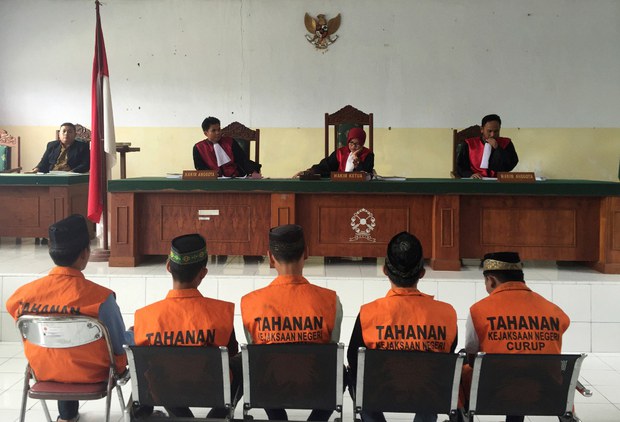Indonesian Doctors Refuse to Castrate Child-Sex Convict
2019.08.27
Jakarta
 Five men, part of a gang of 14 men and boys convicted for the rape and murder of a 14-year-old schoolgirl, sit before judges during sentencing in Curup, in Indonesia’s Bengkulu province, Sept. 29, 2016.
Five men, part of a gang of 14 men and boys convicted for the rape and murder of a 14-year-old schoolgirl, sit before judges during sentencing in Curup, in Indonesia’s Bengkulu province, Sept. 29, 2016.
The association representing medical doctors in Indonesia said Tuesday it would refuse to take part in chemically castrating the first convict sentenced to such punishment under the country’s toughened up child-protection laws against pedophiles.
In May, a court in East Java province’s Mojokerta regency found Muh Aris bin Syukur guilty of sexually abusing nine children, including girls as young as 7, between 2015 and 2018, and sentenced him to 12 years in prison. The judges, in a landmark ruling, ordered that he be chemically castrated to prevent him from committing similar offenses.
The Indonesian Medical Association (IDI) said it would have no role in the castration, even though such corporal punishment was sanctioned under amendments to child-protection laws in 2016.
“We believe that child sex offenders should be punished to the fullest extent of the law, but we cannot administer castrations because doing so will violate our oath to uphold the medical profession’s code of ethics,” Pudjo Hartono, who heads IDI’s professional development council, told BenarNews.
Aris is the first child-sex offender to be sentenced to chemical castration since parliament passed revisions to a related law three years ago. An appeals court in Surabaya last month upheld his conviction.
Chemical castration has not be proven to be effective in the long run and could endanger the health of the person subjected to the punishment, Pudjo said.
Adverse effects of chemical castration include obesity, a swollen face, kidney damage and bone loss, H.N. Nazar, who directs IDI’s legal bureau, said on national television. The procedure involves injecting hormonal drugs.
In response to the announcement by the medical association, the attorney general’s office will meet with Health Minister Nila Moeloek to discuss a solution, according to Mukri, a spokesman for the office.
“We will take it up with the minister, in light of IDI’s refusal to execute castration,” he told BenarNews.
Aris, who was arrested in October last year, said he would rather die than be castrated.
“I can accept 20 years in prison, but I don’t want to be castrated,” local news website JawaPos quoted the 21-year-old, who had worked as a welder, as saying.
“Just shoot me,” he said.
Arguments for and against
The revised child-protection law allows convicted pedophiles to be chemically castrated and implanted with electronic chips to track their movements, in addition to a minimum sentence of 10 years in prison or capital punishment.
President Joko “Jokowi” Widodo had proposed including chemical castration in the legal amendment, in response to a public outcry over the gang rape and murder of a 14-year-old girl in 2016.
Pudjo said IDI would gladly be involved in rehabilitating both victims and perpetrators of sexual violence.
“Such rehabilitation programs require the involvement of experts from various disciplines,” he said.
Yohana Yembise, Indonesia’s minister for Women’s Empowerment and Child Protection, however, praised the court’s verdict and sentencing in the trial of Aris.
“The ministry appreciates the ruling handed down by judges at Mojokerto District Court and the application of additional punishment in the form of castration,” she said.
The castration sentence could create a precedent for cases of sexual assault against children, said a deputy chair of the Indonesian Commission on Child Protection (KPAI), Retno Listyarti.
“[Castration] is an additional sentence imposed after the main sentence has been completed. This is part of efforts to deter child predators,” Retno said.
“This sentence could also serve as jurisprudence for other judges in cases of sexual crimes against children,” she said.
Akmal Taher, a staff expert at the Ministry of Health, said all relevant parties needed to sit together to discuss the merits of castration.
“I’m sure there is a way out,” he said.
Castration by injecting anti-androgen substances would not have a permanent effect and is intended to reduce a convict’s sexual aggressiveness, Akmal said.
Human rights groups, such as the National Commission on Violence against Women (Komnas Perempuan) have criticized the use of chemical castration against convicts.
"Other countries that have chemical castration have not seen a reduction in sexual crimes against children,” Azriana, the head of Komnas Perempuan, told BBC News. “Also it’s a very expensive procedure and what we should be spending and investing our money in is services to support and help the victims."
In July, the Victim and Witness Protection Agency (LPSK) said that cases of sexual violence against children had increased in recent years.
LPSK Deputy Chairman Edwin Partogi said the agency handled four such cases every week.
“We believe that the cases are the tip of the iceberg and do not reflect the real number of victims of sexual violence,” Partogi said last month.
In 2018, at least 206 cases of child sex abuse were reported, a sharp increase from 81 in 2017 and 25 the previous year, he said.
Ahmad Syamsudin in Jakarta contributed to this report.







